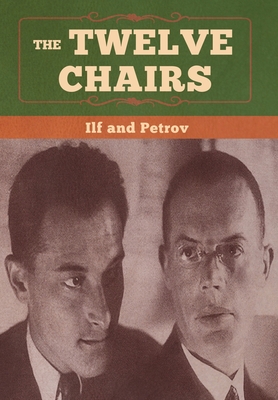The Twelve Chairs

The Twelve Chairs
Ilya Ilf (Ilya Arnoldovich Feinsilberg) (1897-1937) and Evgeny or Yevgeni Petrov (Yevgeniy Petrovich Kataev/Katayev) (1902-1942) were two Soviet prose authors of the 1920s and 1930s. They did much of their writing together, and are almost always referred to as "Ilf and Petrov". They were natives of Odessa. Ilf and Petrov gained a high profile for their two satirical novels: The Twelve Chairs (1928) and its sequel, The Little Golden Calf (1931). The two texts are connected by their main character, Ostap Bender, a con man in pursuit of elusive riches. Both books follow exploits of Bender and his associates looking for treasure amidst the contemporary Soviet reality. They were written and are set in the relatively liberal era in Soviet history, the New Economic Policy of the 1920s. The main characters generally avoid contact with the apparently lax law enforcement. Their position outside the organized, goal-driven, productive Soviet society is emphasized. It also gives the authors a convenient platform from which to look at this society and to make fun of its less attractive and less Socialist aspects. These are among the most widely read and quoted books in Russian culture. The Twelve Chairs was adapted for ca. twenty movies, in the USSR (by Leonid Gaidai and by Mark Zakharov), in the US (in particular by Mel Brooks), and in other countries.From the late 1920s to 1937, the co-authors wrote several theatrical plays and screenplays, as well as many humorous short stories and satirical articles in the magazines: Chudak, 30 days, Krokodil, Ogoniok, the newspapers: Pravda, Literaturnaya Gazeta. In the first years of joint creativity Ilf and Petrov published their stories and satirical under parodic pseudonyms: Tolstoevsky (composed of the names of writers Tolstoy and Dostoevsky), Don Busilio (from Don Basilio, character in the opera The Barber of Seville, and the Russian verb busa - scandal, noise), Cold philosopher and others.The two writers also traveled across the Great Depression-era United States. Ilf took many pictures throughout the journey, and the authors produced a photo essay entitled "American Photographs", published in Ogoniok magazine. Shortly after that they published the book "One-storied America", translated as Little Golden America (an allusion to The Little Golden Calf). The first edition of the book did not include Ilf's photographs. Both the photo essay and the book document their adventures with their characteristic humor and playfulness
PRP: 264.56 Lei
Acesta este Prețul Recomandat de Producător. Prețul de vânzare al produsului este afișat mai jos.
238.10Lei
238.10Lei
264.56 LeiLivrare in 2-4 saptamani
Descrierea produsului
Ilya Ilf (Ilya Arnoldovich Feinsilberg) (1897-1937) and Evgeny or Yevgeni Petrov (Yevgeniy Petrovich Kataev/Katayev) (1902-1942) were two Soviet prose authors of the 1920s and 1930s. They did much of their writing together, and are almost always referred to as "Ilf and Petrov". They were natives of Odessa. Ilf and Petrov gained a high profile for their two satirical novels: The Twelve Chairs (1928) and its sequel, The Little Golden Calf (1931). The two texts are connected by their main character, Ostap Bender, a con man in pursuit of elusive riches. Both books follow exploits of Bender and his associates looking for treasure amidst the contemporary Soviet reality. They were written and are set in the relatively liberal era in Soviet history, the New Economic Policy of the 1920s. The main characters generally avoid contact with the apparently lax law enforcement. Their position outside the organized, goal-driven, productive Soviet society is emphasized. It also gives the authors a convenient platform from which to look at this society and to make fun of its less attractive and less Socialist aspects. These are among the most widely read and quoted books in Russian culture. The Twelve Chairs was adapted for ca. twenty movies, in the USSR (by Leonid Gaidai and by Mark Zakharov), in the US (in particular by Mel Brooks), and in other countries.From the late 1920s to 1937, the co-authors wrote several theatrical plays and screenplays, as well as many humorous short stories and satirical articles in the magazines: Chudak, 30 days, Krokodil, Ogoniok, the newspapers: Pravda, Literaturnaya Gazeta. In the first years of joint creativity Ilf and Petrov published their stories and satirical under parodic pseudonyms: Tolstoevsky (composed of the names of writers Tolstoy and Dostoevsky), Don Busilio (from Don Basilio, character in the opera The Barber of Seville, and the Russian verb busa - scandal, noise), Cold philosopher and others.The two writers also traveled across the Great Depression-era United States. Ilf took many pictures throughout the journey, and the authors produced a photo essay entitled "American Photographs", published in Ogoniok magazine. Shortly after that they published the book "One-storied America", translated as Little Golden America (an allusion to The Little Golden Calf). The first edition of the book did not include Ilf's photographs. Both the photo essay and the book document their adventures with their characteristic humor and playfulness
Detaliile produsului










